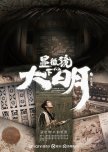A Dry Story Based on Actual Event
Under the Microscope is a story adapted from the Silk Case, one of the six cases under Ma Boyong’s historical textbook. The author has also written numerous well-loved novels, among others, Secret of Three Kingdoms, Luoyang, and The Wind Blows from Longxi. Like the other dramas, the mood of this drama is serious albeit with subtle humor. It is a departure from the usual stories of royalty, noblemen and aristocrats, and instead looks microscopically into the issues faced by the commoners during the Ming Dynasty.
The tax and financial system during the Ming era was a very complicated subject, and the story revolves around a tax called the “ren ding sijuan” (silk by head count). Shuai Jiamo (Zhang Ruoyun) accidentally discovers a silk tax entry on the county’s account book with a questionable amount. He deems it erroneous and requests the county official to rectify the error but is told he needs to appeal to higher up. While attempting to do so, he meets all kinds of obstacles, including attempts on his life; someone is trying to prevent him from appealing and digging deeper. Together with his only friend, Feng Baoyu (Fei Qiming), they are determined to get to the bottom of it despite putting themselves in great danger.
Shuai Jiamo is a young mathematical genius with signs of autism. To him, math always tells the truth and he doesn’t allow a speck of inaccuracy in it. Because of his obsession, most people regard him as an idiot, except Feng Baoyu who thinks Shuai Jiamo very special and would do anything for him. Zhang Ruoyun is an incredible actor. As the autistic Shuai Jiamo, he is genuine and very believable.
To readjust the tax amount on the account book, Shuai Jiamo is told to bring his appeal to court. While in court, he meets Cheng Renqing (Wang Yang), a talented but morally and ethically questionable lawyer working for a shadowy character to try to throw Shuai Jiamo’s case out. He has been successful, but Shuai Jiamo and Feng Baoyu do not give up easily despite getting thrown into prison and their life being threatened. Wang Yang is a veteran actor, and has a charismatic aura. With a smirk on his face and a sharp tongue, his performance is on script and has no holes to poke.
All the other actors give a wonderful and believable performance. I particularly love the Magistrate Fang character (Hou Yansong). Seemingly lazy and useless, he turns out to be the hero of the people and the actor Hou Yansong has performed with full marks. I also like the Feng Baoyu character who loves gambling and is a real friend worth having for anyone. Fei Qiming’s portrayal is outstanding, bringing out the essence of the character convincingly.
My Verdict
This is a true story based on a historical event but not a drama for everyone. Some of the characters such as Shuai Jiamo and Cheng Renqing (written differently but with same homophones) were real historical figures. Shuai Jiamo’s obsession in math and in going to court to correct the tax errors can bore many viewers unless one is very interested in the complicated and confusing Chinese bureaucratic and financial system during Ming Dynasty. To add fireworks to a dry story to make it more palatable for entertainment consumption, some ninjas and wuxia sword fights are added. The scene when Cheng Renqing comes to the rescue of Shuai Jiamo and Feng Baoyu in the nick of time on the beheading tables by throwing out two knives is simply hilarious and unreal.
Though at the end of the drama, it seems everyone receives their justifiable rewards or punishments, it doesn’t feel right to me. Despite all the heinous acts by the villains, the ultimate culprit’s punishments seem like just a slap on the wrist compared to what Shuai Jiamo and Feng Baoyu receive for pointing out the problem -- some of the culprit's wealth is confiscated while the good guys are beaten and imprisoned -- this is probably quite realistic.
In the real event, Shuai Jiamo’s and Cheng Renqing’s fates were not as rosy as shown here; they were both sent away in exile for stirring up "trouble". In other words, the best way to deal with any problems at the local level was to punish those who pointed out the problems. As always, the drama depicts the aristocrats are the ones suppressing and stealing from the people, and the government the enhancer and the gestapo police -- a satire of wealth inequality, the world is never fair nor just.
Overall, this is a dry drama based on a real story full of ironies and paradoxes. The acting is very good and the script writing is tight and logical but too bad, as much as I have enjoyed it, the drama doesn’t make a compelling story for most casual viewers.
The tax and financial system during the Ming era was a very complicated subject, and the story revolves around a tax called the “ren ding sijuan” (silk by head count). Shuai Jiamo (Zhang Ruoyun) accidentally discovers a silk tax entry on the county’s account book with a questionable amount. He deems it erroneous and requests the county official to rectify the error but is told he needs to appeal to higher up. While attempting to do so, he meets all kinds of obstacles, including attempts on his life; someone is trying to prevent him from appealing and digging deeper. Together with his only friend, Feng Baoyu (Fei Qiming), they are determined to get to the bottom of it despite putting themselves in great danger.
Shuai Jiamo is a young mathematical genius with signs of autism. To him, math always tells the truth and he doesn’t allow a speck of inaccuracy in it. Because of his obsession, most people regard him as an idiot, except Feng Baoyu who thinks Shuai Jiamo very special and would do anything for him. Zhang Ruoyun is an incredible actor. As the autistic Shuai Jiamo, he is genuine and very believable.
To readjust the tax amount on the account book, Shuai Jiamo is told to bring his appeal to court. While in court, he meets Cheng Renqing (Wang Yang), a talented but morally and ethically questionable lawyer working for a shadowy character to try to throw Shuai Jiamo’s case out. He has been successful, but Shuai Jiamo and Feng Baoyu do not give up easily despite getting thrown into prison and their life being threatened. Wang Yang is a veteran actor, and has a charismatic aura. With a smirk on his face and a sharp tongue, his performance is on script and has no holes to poke.
All the other actors give a wonderful and believable performance. I particularly love the Magistrate Fang character (Hou Yansong). Seemingly lazy and useless, he turns out to be the hero of the people and the actor Hou Yansong has performed with full marks. I also like the Feng Baoyu character who loves gambling and is a real friend worth having for anyone. Fei Qiming’s portrayal is outstanding, bringing out the essence of the character convincingly.
My Verdict
This is a true story based on a historical event but not a drama for everyone. Some of the characters such as Shuai Jiamo and Cheng Renqing (written differently but with same homophones) were real historical figures. Shuai Jiamo’s obsession in math and in going to court to correct the tax errors can bore many viewers unless one is very interested in the complicated and confusing Chinese bureaucratic and financial system during Ming Dynasty. To add fireworks to a dry story to make it more palatable for entertainment consumption, some ninjas and wuxia sword fights are added. The scene when Cheng Renqing comes to the rescue of Shuai Jiamo and Feng Baoyu in the nick of time on the beheading tables by throwing out two knives is simply hilarious and unreal.
Though at the end of the drama, it seems everyone receives their justifiable rewards or punishments, it doesn’t feel right to me. Despite all the heinous acts by the villains, the ultimate culprit’s punishments seem like just a slap on the wrist compared to what Shuai Jiamo and Feng Baoyu receive for pointing out the problem -- some of the culprit's wealth is confiscated while the good guys are beaten and imprisoned -- this is probably quite realistic.
In the real event, Shuai Jiamo’s and Cheng Renqing’s fates were not as rosy as shown here; they were both sent away in exile for stirring up "trouble". In other words, the best way to deal with any problems at the local level was to punish those who pointed out the problems. As always, the drama depicts the aristocrats are the ones suppressing and stealing from the people, and the government the enhancer and the gestapo police -- a satire of wealth inequality, the world is never fair nor just.
Overall, this is a dry drama based on a real story full of ironies and paradoxes. The acting is very good and the script writing is tight and logical but too bad, as much as I have enjoyed it, the drama doesn’t make a compelling story for most casual viewers.
Was this review helpful to you?


 1
1 5
5 1
1





















